Tristan and Isolde, English National Opera | reviews, news & interviews
Tristan and Isolde, English National Opera
Tristan and Isolde, English National Opera
Heroic tenor Stuart Skelton pulls focus in ambitious, hit-and-miss Wagner
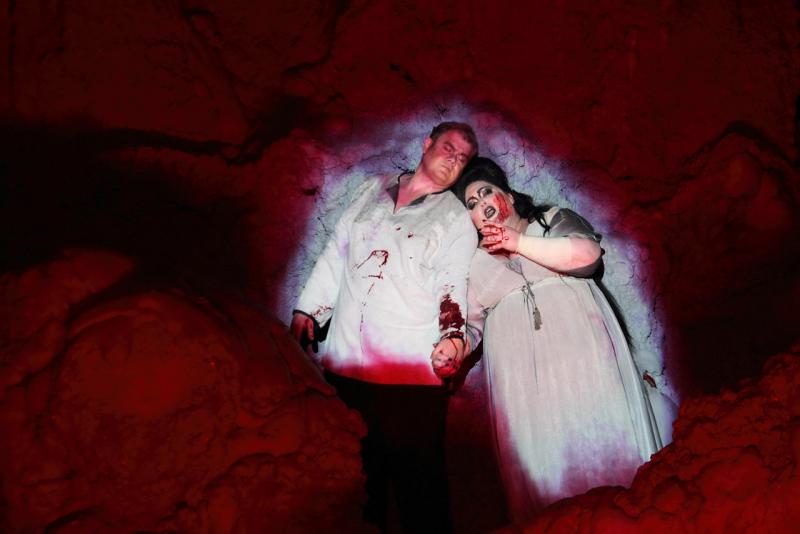
"Bad Star Trek episodes" is how one director describes a certain unfortunate look in would-be intergalactic opera productions. The late Nikolaus Lehnhoff came perilously close to it in his Glyndebourne Tristan und Isolde but offered a coherent vision. Daniel Kramer, now ENO's Artistic Director, has a few "bad Star Trek episodes" and many good ideas that don't always join up or else outstay their welcome.
Let's celebrate the best first. Stuart Skelton's Tristan is the finest account of Wagner's most extreme and taxing operatic character - Brünnhilde and Wotan notwithstanding - that I've ever seen or heard on a stage (the ultimate assumption, Jon Vickers', was just before my time). He runs the gamut of sound from tenderness and near-extinction on a deathbed from which he can't or won't be released to full Heldentenor pelt in expectation of Isolde's arrival and even a dangerous but apt supra-singerly edge for the extremes of the endgame.
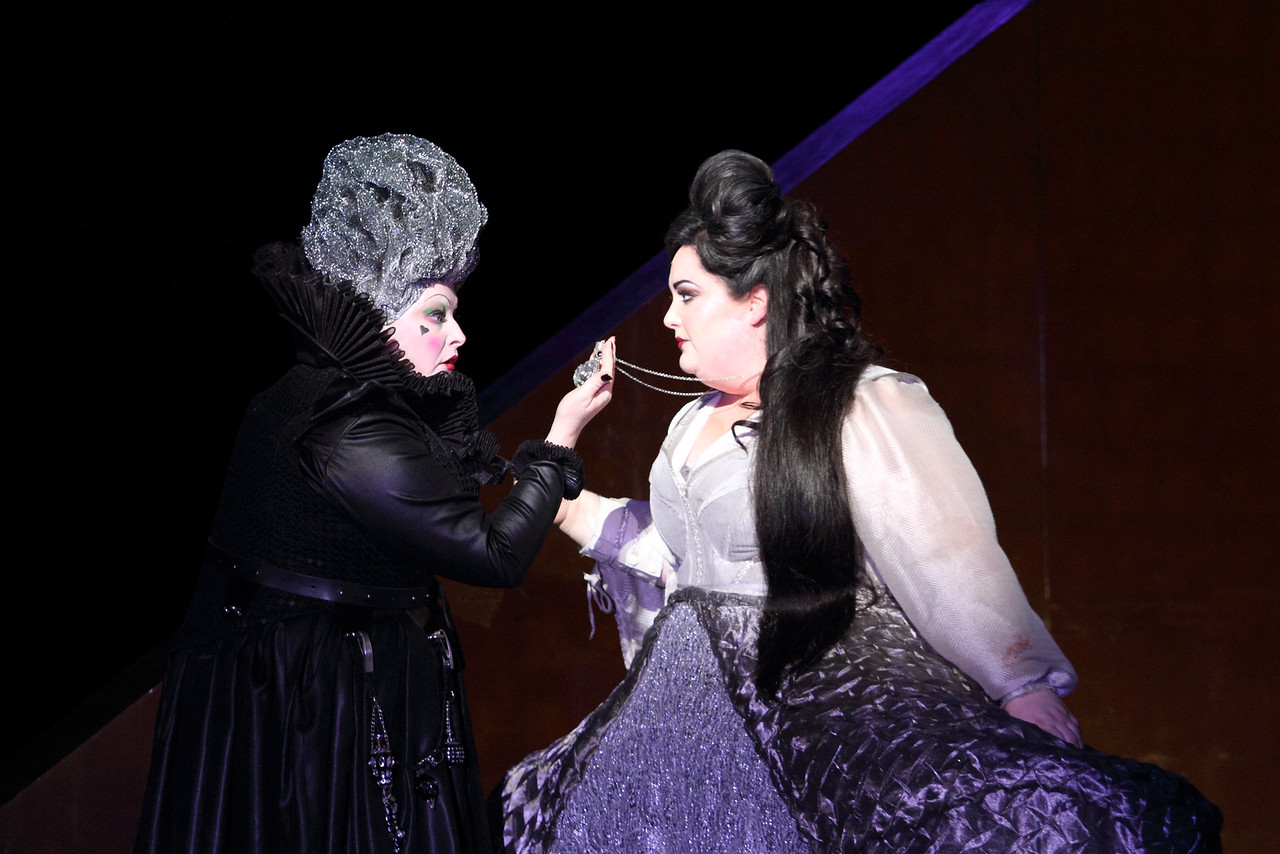 Two other singers amaze. The most extraordinary colours of the evening belong to Karen Cargill's servant Brangäne (pictured above with Melton), sounding instrumental in her Act Two nightwatch; she may be a mezzo, but she could be an Isolde in the making, though best that she first sings Berlioz's Dido, this Wagnerian heroine's true predecessor, as Robin Ticciati wants her to (and ideally at Glyndebourne, with Skelton as Aeneas, please). Matthew Rose shakes the foundations as "betrayed" King Mark.
Two other singers amaze. The most extraordinary colours of the evening belong to Karen Cargill's servant Brangäne (pictured above with Melton), sounding instrumental in her Act Two nightwatch; she may be a mezzo, but she could be an Isolde in the making, though best that she first sings Berlioz's Dido, this Wagnerian heroine's true predecessor, as Robin Ticciati wants her to (and ideally at Glyndebourne, with Skelton as Aeneas, please). Matthew Rose shakes the foundations as "betrayed" King Mark.
It's all the more remarkable that Cargill and Rose triumph given unfortunate get-up and some of the evening's worst concepts. Dramatically, you can see why Kramer wantedBrangäne and Kurwenal to be mincing courtiers - she with brillo-pad Marge Simpson hair, he as Jacobean fop, at odds with his butch music - but their constant campery and fussing over dressing up their mistress and master detract from some key narrative in Act One. Would a newcomer, for instance, pay proper attention to Tristan and Isolde's back story as delivered by the wrathful heroine? And why arraign the lovers for their meeting, only to undress them before the King's arrival?
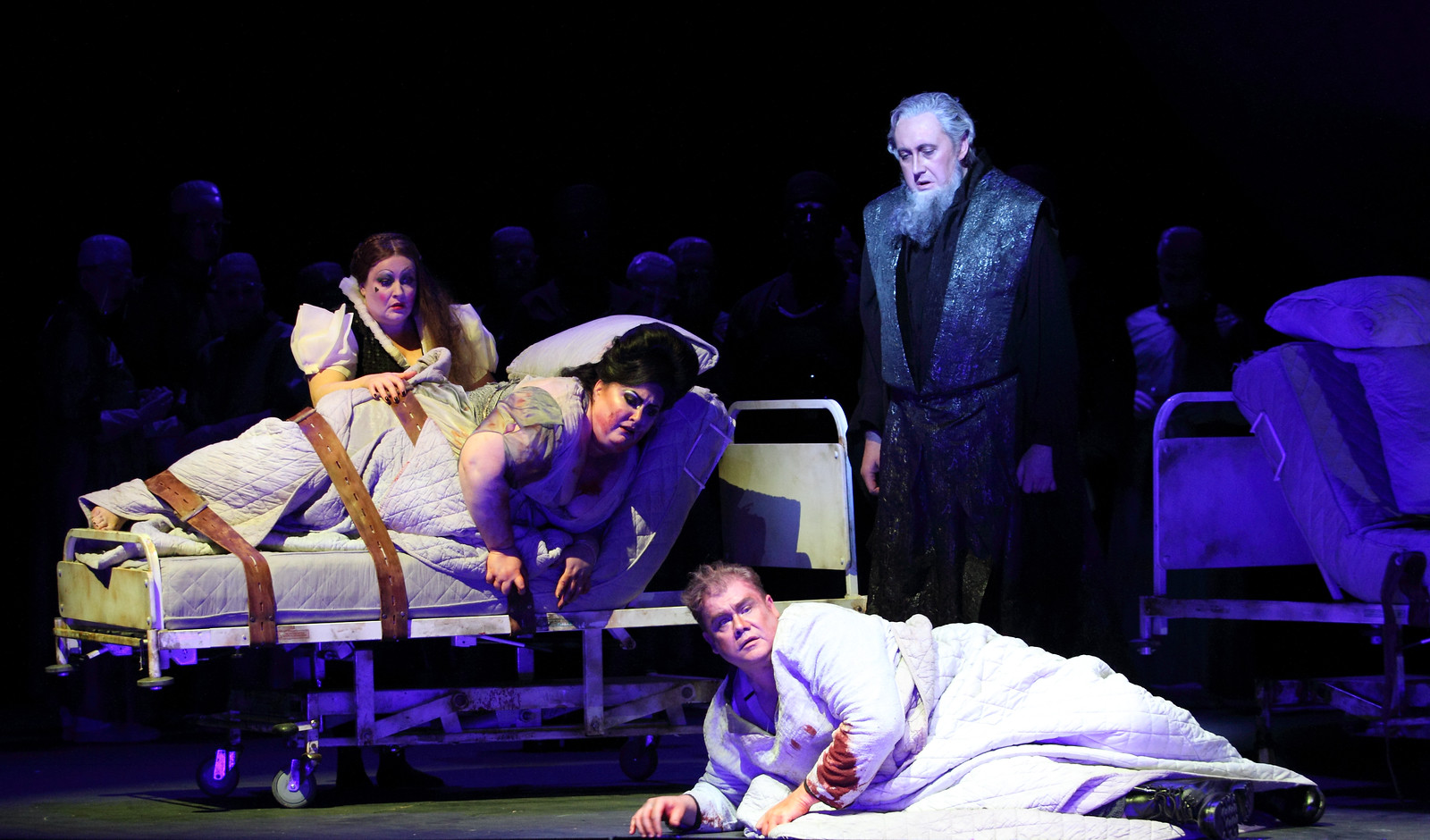 In Act Two, a greybeard Mark - no reason why he should be this old, since he's only the teenage Tristan's uncle - comes on lovers not in flagrante delicto but in the throes of death. It's hard enough at the best of times to feel sympathy for a king who's contracted a marriage of convenience, but for this one to make it all about himself when the wife and friend he's supposed to revere may expire at any moment is an absurdity only Rose's incredibly sympathetic forcefulness can cast aside. (Pictured above, Rose with Cargill, Skelton and Melton)
In Act Two, a greybeard Mark - no reason why he should be this old, since he's only the teenage Tristan's uncle - comes on lovers not in flagrante delicto but in the throes of death. It's hard enough at the best of times to feel sympathy for a king who's contracted a marriage of convenience, but for this one to make it all about himself when the wife and friend he's supposed to revere may expire at any moment is an absurdity only Rose's incredibly sympathetic forcefulness can cast aside. (Pictured above, Rose with Cargill, Skelton and Melton)
Even so, Kramer's idea of the preceding "Night of Love" as an extended episode of suicidal self-harming isn't a bad one; it's no more confused than Wagner's appropriation of Schopenhauer's supposed transcendence over life's wheel of will and desire to his own bizarre notion that the lovers can actually be united on whatever the other side might be. Kapoor's giant moon-as-half-eaten cheese certainly adds to the hypnotic slow-motion horror of the scene, and the claylike substance makes a strong reappearance connected to the flow of dark blood from Tristan's unquenchable wound in Act Three. If only the First Act had co-operated in the whole. The deconstructed wooden pyramid with its three "rooms" (pictured below) should at least allow the singers to be visible in all parts of the theatre since they're at the front of the stage, but reports from the side were that one voice was magnified at the expense of another.
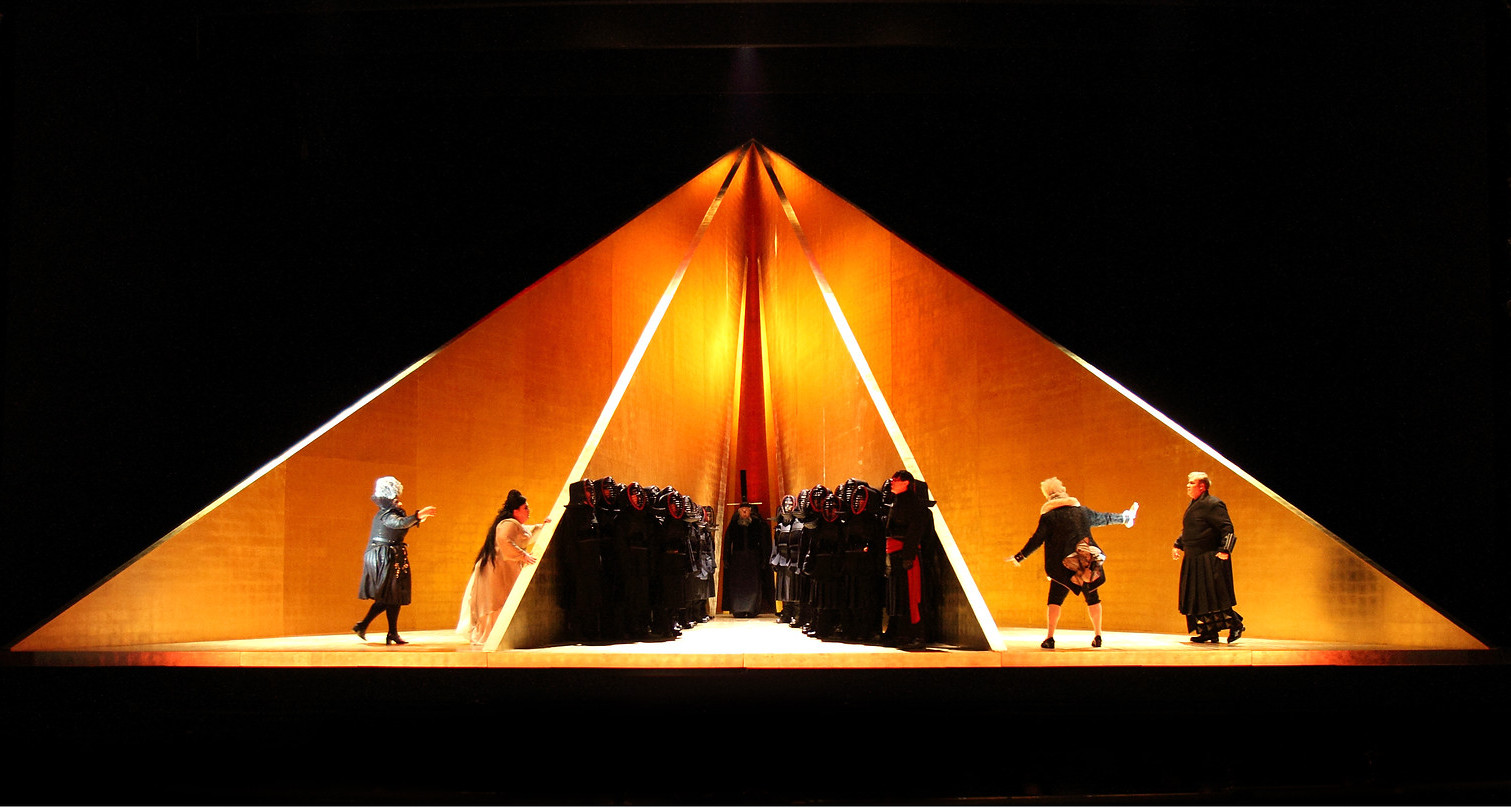
If those spectators were getting more of Heidi Melton's Isolde than Skelton's Tristan, they should not have been too disconcerted. Melton has a warm and lovely middle range, and she's good with the text, though the acting is limited to much rolling of eyes. She can certainly just about manage Isolde now, but she won't be singing anything in five years' time if she persists with the role; this is a voice better suited to Wagner's Elsa and Elisabeth - which she sang beautifully in the Proms Tannhäuser three years ago. The top is effortful in two of the three passages of what Richard Strauss called "erotic screaming", and she only just makes the end of the Liebestod (or "Transfiguration through Love" as it truly becomes here - I won't spoil Kramer's last idea, one of his best).
Melton doesn't always get the help she needs from Edward Gardner in the pit. After his perfectly flowing Mastersingers last season, he seemed less certain of pace here, indulging too many slow tempi when the action needs to move forward. The Prelude's steady kindling was fine: towards the climax I could swear the Coliseum's gold-inflected 2004 dropcloth was levitating long before it actually did. But Isolde's narrative loses energy, and last night Melton was stretched too far by the crucial phrase in which she tells Brangäne how the wounded Tristan in Ireland looked into her eyes as she was about to kill him.
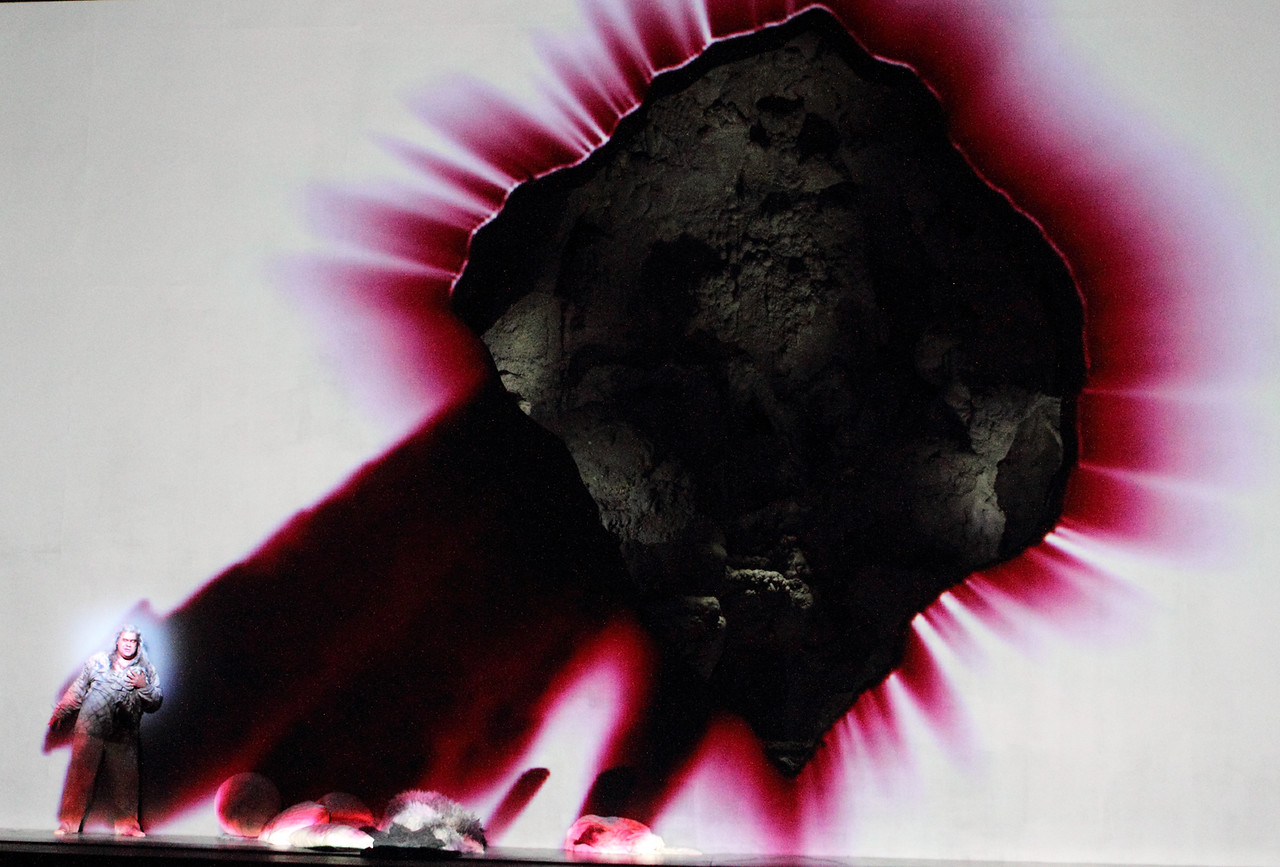
The string sound is rich, but the players don't quite burn for their former music director. There's another dip in tension before the crucial potion taking, too, though not before the heart of the Act Two love duet, thanks to a whopping cut (Kramer and Gardner need to trust Wagner and their audience). The point of repose doesn't quite flow or glow as it did under Pappano in the intelligent and consistent Christof Loy production at the Royal Opera, surely the best of recent years.
Act Three works best thanks mostly to Skelton's resilience in bloody extremes (pictured above), though I pity Craig Colclough, the vocally stalwart Kurwenal, having to jabber around as a scabby old Feste or Fool (point taken in what Kramer has clearly read is more Beckett nullity than Shakespearean raging). At the denouement Frieder Weiss's video projection - stunning when it works properly - goes berserk and the awkward follow-spots of Paul Anderson's erratic lighting give way to a flickering mess; thankfully the last tableau is static. Never dull, sometimes annoying, at best - if only fitfully - electrifying, the end result does let Wagner shine through. And three stars in his universe would be four and a half in any other.
rating
Share this article
Add comment
more Opera
 Simon Boccanegra, Hallé, Elder, Bridgewater Hall, Manchester review - thrilling, magnificent exploration
Verdi’s original version of the opera brought to exciting life
Simon Boccanegra, Hallé, Elder, Bridgewater Hall, Manchester review - thrilling, magnificent exploration
Verdi’s original version of the opera brought to exciting life
 Aci by the River, London Handel Festival, Trinity Buoy Wharf Lighthouse review - myths for the #MeToo age
Star singers shine in a Handel rarity
Aci by the River, London Handel Festival, Trinity Buoy Wharf Lighthouse review - myths for the #MeToo age
Star singers shine in a Handel rarity
 Carmen, Royal Opera review - strong women, no sexual chemistry and little stage focus
Damiano Michieletto's new production of Bizet’s masterpiece is surprisingly invertebrate
Carmen, Royal Opera review - strong women, no sexual chemistry and little stage focus
Damiano Michieletto's new production of Bizet’s masterpiece is surprisingly invertebrate
 La scala di seta, RNCM review - going heavy on the absinthe?
Rossini’s one-acter helps young performers find their talents to amuse
La scala di seta, RNCM review - going heavy on the absinthe?
Rossini’s one-acter helps young performers find their talents to amuse
 Death In Venice, Welsh National Opera review - breathtaking Britten
Sublime Olivia Fuchs production of a great operatic swansong
Death In Venice, Welsh National Opera review - breathtaking Britten
Sublime Olivia Fuchs production of a great operatic swansong
 Salome, Irish National Opera review - imaginatively charted journey to the abyss
Sinéad Campbell Wallace's corrupted princess stuns in Bruno Ravella's production
Salome, Irish National Opera review - imaginatively charted journey to the abyss
Sinéad Campbell Wallace's corrupted princess stuns in Bruno Ravella's production
 Jenůfa, English National Opera review - searing new cast in precise revival
Jennifer Davis and Susan Bullock pull out all the stops in Janáček's moving masterpiece
Jenůfa, English National Opera review - searing new cast in precise revival
Jennifer Davis and Susan Bullock pull out all the stops in Janáček's moving masterpiece
 theartsdesk in Strasbourg: crossing the frontiers
'Lohengrin' marks a remarkable singer's arrival on Planet Wagner
theartsdesk in Strasbourg: crossing the frontiers
'Lohengrin' marks a remarkable singer's arrival on Planet Wagner
 Giant, Linbury Theatre review - a vision fully realised
Sarah Angliss serves a haunting meditation on the strange meeting of giant and surgeon
Giant, Linbury Theatre review - a vision fully realised
Sarah Angliss serves a haunting meditation on the strange meeting of giant and surgeon
 Der fliegende Holländer, Royal Opera review - compellingly lucid with an austere visual beauty
Bryn Terfel's Dutchman is a subtly vampiric figure in this otherworldly interpretation
Der fliegende Holländer, Royal Opera review - compellingly lucid with an austere visual beauty
Bryn Terfel's Dutchman is a subtly vampiric figure in this otherworldly interpretation
 The Magic Flute, English National Opera review - return of an enchanted evening
Simon McBurney's dark pantomime casts its spell again
The Magic Flute, English National Opera review - return of an enchanted evening
Simon McBurney's dark pantomime casts its spell again
 Così fan tutte, Welsh National Opera review - relevance reduced to irrelevance
School for lovers not much help to the singers
Così fan tutte, Welsh National Opera review - relevance reduced to irrelevance
School for lovers not much help to the singers

Comments
The singing in this new
The singing in this new Tristan was superlative and if one shut one's eyes it was the arguably the best we had ever experienced live. But then there is the production and the set design to consider. Sitting in prime seats at the extreme right hand side of the stalls only allowed a restricted view of the action. In the first scene singers were sometimes invisible and in the first part of the final 'liebestod' the singing seemed to emerge from a concealed hole in a rocky backdrop designed as a sort of mountainous obstacle course for the principal singers, whom one hopes were adequately insured. The costumes and make-up were also distracting and at times inexplicably grotesque. Please, please, ENO, remember that we not only come to hear great music (which we did) but also to see it being produced. We wonder how long this current trend of form over substance will continue. Perhaps it is a case of the Emperor's clothes?
Apologies - something seems
Apologies - something seems to have happened to the text at the end of my comments. I meant to say 'produced to the same high standards.'
It's always useful to hear
It's always useful to hear from audience members who sat in different parts of the theatre. I hadn't thought, for instance, that from another seat the lovers might be invisible in their limestone cave. It's the director's duty to go everywhere in the theatre and check the sightlines, just as it should be the conductor's to have a deputy in his or her place and go out and test balances, as Solti learned from Richard Strauss, but Gardner would seem not to have done that either - I should have mentioned that occasionally the orchestra swamped the singers beyond the necessary.
I think you'll find that the
I think you'll find that the 'erratic lighting' and 'awkward followspots' of act III were video projection and not Paul Andersons lighting design. I think David Nice owes Mr Anderson an apology
Maybe not the very final
Maybe not the very final chaos, but the followspots were not video projection. And I hold to my point that the lighting was erratic, especially in Act One where the singers were in shadow too often, though I should perhaps have separated it from the video projection which was generally - until the end - very good.
Anyway, I have amended the sentences in question accordingly.
Vickers never sang
Vickers never sang Tannhauser. He pulled out of a ROh production at rehearsal stage allegedly on maral grounds although many suspected he found the high tessitura too difficult
I assume you're making a
I assume you're making a peripheral point about Vickers there. Certainly not saying that he ever did sing Tannhauser on stage, only Tristan.
Your reviewer does not have a
Your reviewer does not have a clue. One of the best Wagners I have ever seen. Sets are brilliant. Singing from all is out of this world and the orchestra under Ed Gardener has never sounded better. What a load of bollocks to try and share a political point when there is none to be gained. Get somebody who knows What they are talking about instead of spouting a load of bull for the sake of it!!!!!!!!!
Simon Morgan
The orchestra did sound good,
The orchestra did sound good, as it had in Mastersingers, but I would suggest that a lot of work has been done on string tone and depth by Mark Wigglesworth in the interim. But if you admire 'Ed Gardener' so much - and I generally have - I suggest you learn how to spell his name.
But don't you think it's discourteous to accuse anyone who doesn't agree with you of 'spouting a load of bull'?
No.
No.
I so agree with you. Anish
I so agree with you. Anish Kapoor's sets were incisive, sensitive and stunningly beautiful - the existential philosophical elements of this extraordinary psychological opera were enhanced strikingly by them as they reflected and tracked the Schopenhauer thought behind the work.
I directed Vickers in his
I directed Vickers in his Covnt Garden Tristan's.There has never been such performance again.The metaphysical agony,the sheer titanic engulfing emotions in love and guilt of betrayal were unique.The Isolde of Roberta Knie and Gwyneth Jones embodied the dual anima/animus of the role.They also looked beautiful.The performances were so great,integrated and magnificent that I decided that it should be performed in clear white light.This review by David Nice is on the right track.
Good to hear from a great
Good to hear from a great name. Of course I did at least see JV as your Peter Grimes, though I may not have been mature enough to appreciate how amazing he was. Vickers AND Jones - my goodness, would that I'd been there. I still count Dame Gwyneth's Salome, Elektra and Brunnhilde among the top ten (or maybe even five) operatic performances I've ever seen. At least there's a DVD of her Isolde, albeit not in your production.
I still think Skelton would compare quite favourably with your ultimate Tristan, if you have a chance to see him.